Sir Arthur: Legislative change is “good” but changes must be made in the fundamental law with a referendum
NASSAU, BAHAMAS — The Founding Fathers could not agree on “complete and utter equality for women” in the Bahaman constitution, recalled Sir Arthur Foulkes, one of the only five surviving signatories of the Bahamian constitution.
In an exclusive interview with Eyewitness News, Sir Arthur recalled the discussions leading up to the signing of the document, a day he said he and the other signatories knew was a historic day.
 That group of 15 men that signed the constitution included Foulkes, Sir Orville Turnquest, former PLP Cabinet Minister George Smith, former Immigration Minister Loftus Roker, Arthur D Hanna, Sir Lynden Pindling, Sir Milo Butler, Sir Clement T, Maynard, Paul Adderley, Sir Kendal Isaacs, Norman Solomon, Carlton E. Francis, Phillip Bethel, Cadwell Armbrister and Henry Bowen.
That group of 15 men that signed the constitution included Foulkes, Sir Orville Turnquest, former PLP Cabinet Minister George Smith, former Immigration Minister Loftus Roker, Arthur D Hanna, Sir Lynden Pindling, Sir Milo Butler, Sir Clement T, Maynard, Paul Adderley, Sir Kendal Isaacs, Norman Solomon, Carlton E. Francis, Phillip Bethel, Cadwell Armbrister and Henry Bowen.
Sir Arthur however maintained that the fundamental rights included in The Bahamas’ constitution “can take us into a modern Bahamas”.
“We have a good constitution. And our constitution was written with the education of the experience of other people,” he said.
“We just didn’t pull it out of the air. We had the experience of other people, Britain, and others and particularly our civil rights.”
Sir Arthur continued, “…But that is not to say that there were things that needed to be changed.
“In fact, there were things that needed to be changed when we wrote it he said.
“One of them has always been to my heart which we could not agree on and we have not been able not agree on since was complete and utter equality for women.
“That was a flaw in our constitution from the beginning and I hope we get to change that.”
There has been an ongoing discussion with dissenting opinions regarding the interpretation of the constitution and the right of Bahamian women to pass on citizenship.
Article 6 of the constitution states that “Every person born in The Bahamas after July 9, 1973, shall become a citizen at the date of his birth if at that date either of his parents is a citizen of The Bahamas.”
Meanwhile, Article 14(1) of the constitution states, “Any reference in the chapter to the father of a person shall, in relation to any person born out of wedlock other than a person legitimated before July 10, 1973, be construed as a reference to the mother of that person.”
The Court of Appeal recently upheld a historic Supreme Court ruling over the true interpretation of Article 6 of the Constitution, making it so that children born out of wedlock to foreign women and Bahamian men are entitled to citizenship at birth.
The government has applied to the Privy Council to appeal the ruling.
Attorney General Ryan Pinder has said the government intends to address citizenship, immigration and other matters in a compendium of bills to be presented to Cabinet shortly.
Several versions of a draft bills have been done by the Law Reform Commission, headed by Allen, that would repeal the Bahamas Nationality Act and the Immigration Act.
Legislation v.s. referendum
But Sir Arthur said while the government of the day has signaled legislation will be brought forward to seek to address the shortcomings, the change must be made at a constitutional level.

“That’s a good step what is being proposed now but that’s legislation, which is all right, which is good. But still, the change needs to be made in our fundamental law because some future Parliament can change that,” he charged.
“The whole idea of having these things entrenched in the Constitution is that they’re not so easy to change.
“And that’s the unfortunate part about it. And on the face of it, the equality of women should be unquestionably entrenched in our Constitution. And I hope, despite all the talk that there would be at some point, we decide to do that.
“And I believe that if the politicians get together, the leadership on both sides and agree on these things and go to the people on the right, I think the Bahamian people will accept.”
Both the previous referenda on the matter were largely rejected by the Bahamian public.
The referendum under the Ingraham administration on February 27, 2002 covered a broad range of constitutional issues and was shrouded in politics.
The 2016 referendum under the Christie administration was equally mired in politics and the questions were highly debated across different sectors of society.
Sir Arthur said the problem with those processes was the leadership of the day.
“It was the political leadership. The political leadership was together and in agreeance on the amendment. But when they went to the people that they were divided about and that was the problem.”
The former governor general contended however that while there are a few things that would require changes, “the fundamentals of our Constitution are sound level.”
“We were acutely aware of the historic importance of that day and that time and those signatures on that piece of paper which created the independent Bahamas state,” Sir Arthur recalled.
“…We’re only 50 years as an independent state, but we have been a people long before that.
“When did we actually come into existence as a people? I don’t know. But we were Bahamians long before 1973 and long before the stamp of independence.”


















